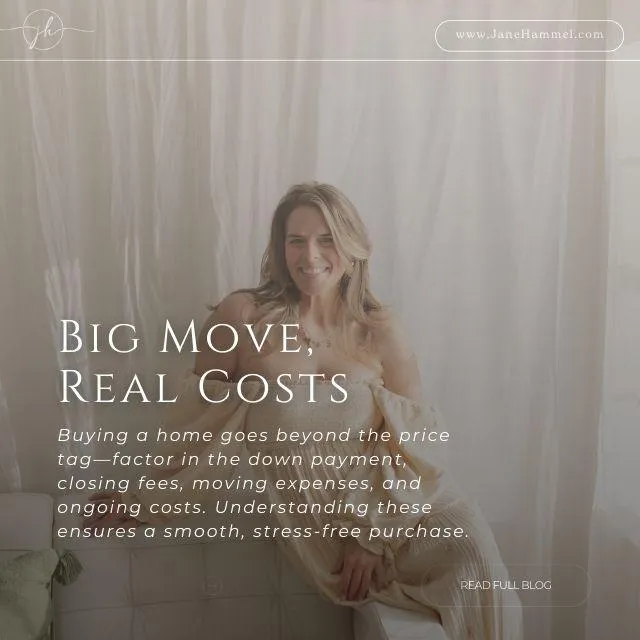
Breaking Down the Costs of Your Big Move: A Guide to Buying a House
Purchasing a home is one of life’s most exciting milestones, but it’s essential to look beyond the listing price. From down payments to closing costs, understanding the full range of expenses can help you budget effectively and avoid surprises. Here’s a comprehensive guide to the costs associated with buying your dream home.
Down Payment
The down payment is often the largest upfront cost when purchasing a home. Depending on the type of mortgage and your financial situation, this amount can vary widely:
Conventional Loans: Typically require 5-20% of the purchase price.
FHA Loans: Allow down payments as low as 3.5%, making them popular for first-time buyers.
Luxury Properties: Often require larger down payments, sometimes 20-30%, due to jumbo loan requirements.
For example, if you’re purchasing a $500,000 home with a 20% down payment, you’ll need $100,000 upfront. Planning for this significant expense is crucial to avoiding financial strain.
Closing Costs
Closing costs are another major expense to consider. These fees typically range from 2-5% of the home’s purchase price and cover services such as:
Appraisal and Inspection Fees: Ensure the home’s value and condition.
Loan Origination Fees: Charged by lenders to process your mortgage.
Title Insurance and Escrow Fees: Protect your ownership rights and manage transaction funds.
Property Taxes and Homeowners Insurance: Often prepaid at closing.
For a $500,000 home, closing costs could amount to $10,000-$25,000. Your real estate agent or lender can provide a detailed estimate to help you prepare.
Moving Costs
Don’t overlook the cost of moving into your new home. Expenses can include:
Hiring professional movers.
Renting a moving truck.
Purchasing packing supplies.
Temporary storage fees.
The average cost of a local move can be $1,250-3,500 (depending on size of home and service level), while long-distance moves can exceed $4,000, depending on the distance and size of your household, and how much help you want from your mover with packing, or moving specialty items.
Need a mover recommendation? I’ve got one for you; they offer all Frank Hardy Sotheby’s clients 10% off, all the time. Just ask me who!
Ongoing Costs
Beyond the upfront expenses, owning a home comes with ongoing costs that buyers should factor into their budgets:
Mortgage Payments: Include principal, interest, taxes, and insurance (often referred to as PITI).
Maintenance and Repairs: Experts recommend budgeting 1-3% of the home’s value annually for upkeep.
Homeowners Association (HOA) Fees: Applicable in communities with shared amenities or maintenance.
Utilities: Vary by location and property size, covering water, electricity, gas, and internet.
Optional Costs
Depending on your preferences and circumstances, you may also incur optional costs such as:
Upgrades and Renovations: Personalizing your space or addressing outdated features.
Home Warranties: Covering repairs or replacements for appliances and major systems.
Private Mortgage Insurance (PMI): Required for down payments under 20% on conventional loans.
How to Budget Effectively
Planning ahead is key to managing the costs of buying a home. Follow these tips to stay on track:
Save for the Down Payment Early: Set up a dedicated savings account to build your funds over time.
Understand Your Loan Options: Work with a mortgage broker to identify the best financing solution for your needs.
Request a Closing Cost Estimate: Ask your lender for a Loan Estimate form to understand expected fees.
Build an Emergency Fund: Ensure you have a financial cushion for unexpected repairs or expenses after moving in.
Work with Trusted Professionals: A skilled real estate agent and financial advisor can guide you through the process and help you make informed decisions.
Buying a home is a significant financial commitment, but understanding the full scope of costs can make the process smoother and more rewarding. With careful planning and expert guidance, you can turn your dream home into a reality without compromising your financial goals.
Ready to start your home buying journey? Let’s connect and break down the costs together, ensuring your big move is as seamless as possible.
